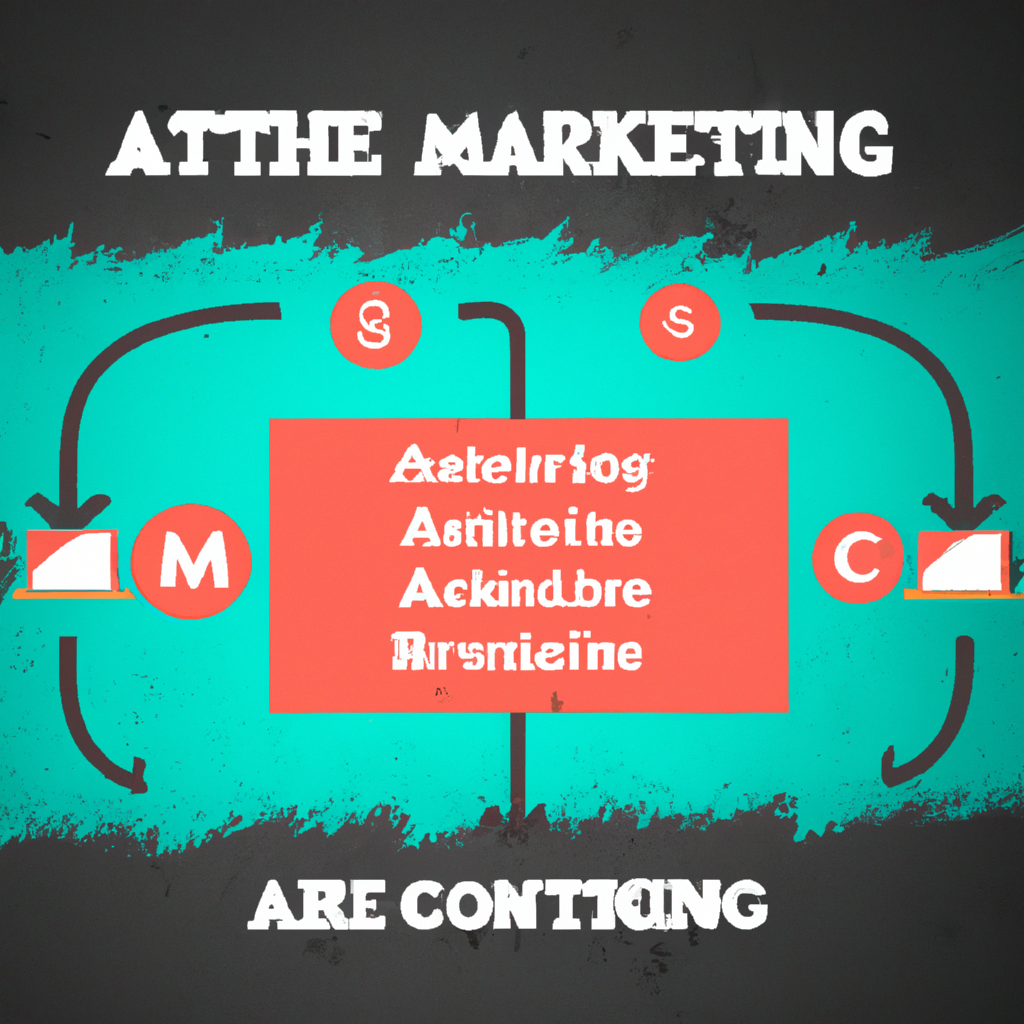
The role of affiliate marketing in content marketing
-
Table of Contents
- Introduction
- How Affiliate Marketing Can Help Content Marketers Reach Their Goals
- The Benefits of Incorporating Affiliate Marketing Into Your Content Strategy
- How to Leverage Affiliate Marketing to Increase Your Content Reach
- The Pros and Cons of Using Affiliate Marketing in Content Marketing
- How to Measure the Success of Your Affiliate Marketing Content Campaigns
- Q&A
- Conclusion
“Unlock the Power of Affiliate Marketing to Maximize Your Content Marketing Results!”
Introduction
Affiliate marketing is an important part of content marketing. It is a performance-based marketing strategy that rewards affiliates for driving traffic and sales to a business’s website. Affiliate marketing is a great way to reach new customers and increase brand awareness. It can also be used to drive more sales and increase revenue. By leveraging the power of affiliate marketing, businesses can create content that is more engaging and effective. This content can then be used to attract more customers and increase sales. Affiliate marketing can be used to create content that is more targeted and relevant to the target audience. This content can then be used to drive more traffic and sales to the business’s website. By leveraging the power of affiliate marketing, businesses can create content that is more engaging and effective.
How Affiliate Marketing Can Help Content Marketers Reach Their Goals
Affiliate marketing is a powerful tool for content marketers looking to reach their goals. It is a form of performance-based marketing in which a business rewards an affiliate for each customer or visitor brought to the business by the affiliate’s own marketing efforts.
Content marketers can use affiliate marketing to increase their reach and visibility. By partnering with affiliates, content marketers can leverage their existing content to reach a larger audience. Affiliates can help content marketers reach their goals by promoting their content to their own audiences. This can help content marketers reach new audiences and increase their visibility.
Affiliate marketing can also help content marketers generate more revenue. Affiliates can earn commissions for each sale they generate for the content marketer. This can help content marketers increase their revenue and reach their goals.
Finally, affiliate marketing can help content marketers build relationships with their affiliates. Content marketers can use affiliate marketing to build relationships with their affiliates and create a mutually beneficial relationship. This can help content marketers build trust and loyalty with their affiliates, which can lead to more sales and increased revenue.
Overall, affiliate marketing is a powerful tool for content marketers looking to reach their goals. It can help content marketers increase their reach, visibility, and revenue. By leveraging the power of affiliates, content marketers can reach new audiences and generate more revenue.
The Benefits of Incorporating Affiliate Marketing Into Your Content Strategy
Affiliate marketing is a powerful tool for businesses looking to increase their online presence and generate more revenue. By incorporating affiliate marketing into your content strategy, you can leverage the power of influencers and affiliates to reach a larger audience and drive more sales. Here are some of the benefits of incorporating affiliate marketing into your content strategy:
1. Increased Reach: Affiliate marketing allows you to tap into a larger audience than you would be able to reach on your own. By partnering with influencers and affiliates, you can reach a wider range of potential customers and increase your brand’s visibility.
2. Increased Engagement: Affiliate marketing can help you engage with your target audience in a more meaningful way. By partnering with influencers and affiliates, you can create content that resonates with your target audience and encourages them to take action.
3. Increased Revenue: Affiliate marketing can help you generate more revenue by driving more sales. By partnering with influencers and affiliates, you can increase your sales and generate more revenue for your business.
4. Cost-Effective: Affiliate marketing is a cost-effective way to increase your online presence and generate more revenue. By partnering with influencers and affiliates, you can reach a larger audience without having to invest in expensive advertising campaigns.
Incorporating affiliate marketing into your content strategy can be a great way to increase your reach, engagement, and revenue. By leveraging the power of influencers and affiliates, you can reach a larger audience and drive more sales. With the right strategy, you can maximize the potential of affiliate marketing and take your business to the next level.
How to Leverage Affiliate Marketing to Increase Your Content Reach
Affiliate marketing is a powerful tool for content creators to increase their reach and grow their audience. By partnering with other businesses and websites, content creators can leverage their affiliate relationships to drive more traffic to their content.
Affiliate marketing works by having content creators promote products or services from other businesses in exchange for a commission. When a customer clicks on the affiliate link and makes a purchase, the content creator earns a commission. This commission can be used to increase the reach of the content creator’s content.
Content creators can use affiliate marketing to increase their reach in several ways. First, they can use affiliate links in their content to drive more traffic to their content. This can be done by including affiliate links in blog posts, videos, and other content. Content creators can also use affiliate links in their social media posts to drive more traffic to their content.
Content creators can also use affiliate marketing to increase their reach by partnering with other businesses and websites. Content creators can partner with other businesses and websites to promote their content in exchange for a commission. This can be done by creating sponsored posts, guest posts, and other forms of content promotion.
Content creators can also use affiliate marketing to increase their reach by creating an affiliate program. An affiliate program allows content creators to recruit other businesses and websites to promote their content in exchange for a commission. This can be done by offering incentives such as discounts, free products, or other rewards.
By leveraging affiliate marketing, content creators can increase their reach and grow their audience. By partnering with other businesses and websites, content creators can drive more traffic to their content and earn commissions. Content creators can also create an affiliate program to recruit other businesses and websites to promote their content. By using these strategies, content creators can increase their reach and grow their audience.
The Pros and Cons of Using Affiliate Marketing in Content Marketing
Affiliate marketing is a popular form of content marketing that has been used by many businesses to increase their online presence and generate more sales. While it can be a great way to reach a larger audience and increase revenue, there are some potential drawbacks to consider before using it.
Pros
1. Increased Reach: Affiliate marketing can help you reach a larger audience than you would be able to reach on your own. By partnering with other websites and influencers, you can get your content in front of a much larger audience.
2. Cost-Effective: Affiliate marketing is a cost-effective way to promote your content. You only pay for the results you get, so you don’t have to worry about spending money on ads that don’t generate any sales.
3. Increased Brand Awareness: Affiliate marketing can help you build brand awareness and trust with your target audience. By partnering with other websites and influencers, you can get your content in front of a much larger audience and build relationships with potential customers.
Cons
1. Lack of Control: When you use affiliate marketing, you don’t have as much control over the content that is being promoted. You have to trust that the affiliates are promoting your content in the right way and that they are not misrepresenting your brand.
2. Low Conversion Rates: Affiliate marketing can have low conversion rates, which means that you may not get as many sales as you would like. This can be especially true if you are targeting a niche audience.
3. Time-Consuming: Affiliate marketing can be time-consuming, as you have to find the right affiliates to partner with and manage the relationships. This can take up a lot of your time and resources.
Overall, affiliate marketing can be a great way to increase your reach and generate more sales. However, it is important to consider the potential drawbacks before using it. If you do decide to use affiliate marketing, make sure to do your research and find the right affiliates to partner with.
How to Measure the Success of Your Affiliate Marketing Content Campaigns
Measuring the success of an affiliate marketing content campaign is essential for understanding the effectiveness of your efforts and for making informed decisions about future campaigns. There are several key metrics that can be used to evaluate the success of your content campaigns.
1. Traffic: One of the most important metrics to measure is the amount of traffic your content is generating. This can be measured by tracking the number of visitors to your website or blog, as well as the number of clicks on your affiliate links.
2. Conversion Rate: The conversion rate is the percentage of visitors who take a desired action, such as making a purchase or signing up for a newsletter. This metric can be used to measure the effectiveness of your content in driving sales or leads.
3. Engagement: Engagement is a measure of how engaged your audience is with your content. This can be measured by tracking the number of comments, shares, and likes your content receives.
4. Return on Investment (ROI): ROI is a measure of how much money you are making from your content campaigns. This can be calculated by subtracting the cost of the campaign from the revenue generated.
By tracking these metrics, you can gain valuable insights into the success of your content campaigns and make informed decisions about future campaigns.
Q&A
Q1: What is affiliate marketing?
A1: Affiliate marketing is a type of performance-based marketing in which a business rewards one or more affiliates for each visitor or customer brought by the affiliate’s own marketing efforts.
Q2: How does affiliate marketing fit into content marketing?
A2: Affiliate marketing can be used as a tool to help promote content marketing efforts. Affiliates can be used to drive traffic to content, increase brand awareness, and generate leads.
Q3: What are the benefits of using affiliate marketing in content marketing?
A3: The benefits of using affiliate marketing in content marketing include increased visibility, increased reach, and increased engagement. Affiliates can also help to drive conversions and sales.
Q4: What are some best practices for using affiliate marketing in content marketing?
A4: Some best practices for using affiliate marketing in content marketing include selecting the right affiliates, creating compelling content, and tracking performance. It is also important to ensure that the affiliate program is compliant with applicable laws and regulations.
Q5: What are some challenges associated with using affiliate marketing in content marketing?
A5: Some challenges associated with using affiliate marketing in content marketing include finding the right affiliates, managing the program, and ensuring compliance with applicable laws and regulations. Additionally, it can be difficult to track performance and measure the success of the program.
Conclusion
Affiliate marketing is an important part of content marketing, as it allows businesses to reach a wider audience and increase their sales. It is a cost-effective way to promote products and services, and it can be used to drive traffic to a website or blog. Affiliate marketing can also be used to build relationships with customers and create loyalty. By leveraging the power of affiliate marketing, businesses can increase their reach and generate more leads and sales.


